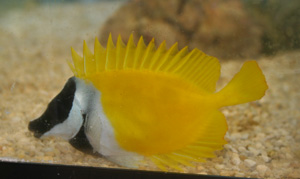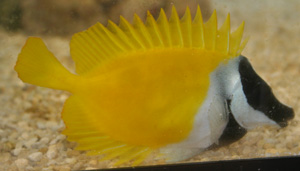|
|
Foxface Rabbitfish – Siganus vulpinus
The foxface rabbitfish, also called the badgerfish, comes from the western pacific. They are a fairly hardy fish but their spines are poisonous and should be avoided. These fish are pretty disease resistant. 
Maximum Size: The foxface rabbitfish should grow to a maximum size of 9.4 inches
Minimum Tank Size: The minimum tank size should be 75 gallons
Care Level: The foxface rabbitfish is a very hardy fish to maintain. On a scale of 1 –10, (10 being easy) it would rate a “8”. The tank does not necessarily have to be cycled before introducing this fish.
Tank Conditions: Temperature 77-79°F; Specific gravity: 1.021 – 1.024; pH: 8.1 – 8.3; Nitrates should be no more than 20 ppm.
Color: The foxface rabbitfish – as picture shows has a bright yellow body with black and white stripes over the face.
 Temperament: This is a good fish. It can ultimately become aggressive to other rabbitfishs of its kind. It is generally not aggressive to other fish species. As noted above, the spines are poisonous – so care must be exercised when working around these fish. If stung, it is not necessarily dangerous – that is unless you have a reaction to the poison. Temperament: This is a good fish. It can ultimately become aggressive to other rabbitfishs of its kind. It is generally not aggressive to other fish species. As noted above, the spines are poisonous – so care must be exercised when working around these fish. If stung, it is not necessarily dangerous – that is unless you have a reaction to the poison.
Reef Compatible: The foxface rabbitfish can and will nip at soft and hard corals. Also they will destroy invertebrates.
Diet: The foxface rabbitfish is an omnivore that eats more vegetable matter than meet. You should provide a constant supply of algae, sushi nori and you can also provide blanched spinach or lettuce leaves. Additionally, foods such as brine-shrimp, plankton, clams, mussels, and squid should be offered.
Habitat: Good water circulation is important as well as high quality water maintenance. Filtration should include a protein skimmer and activated carbon filtration.
Lighting: Depending on the tank setup you desire. The foxface rabbitfish needs no special setup
Compatibility: Rabbitfish in general can be kept with all other species of fish. They should not be housed with groupers, sharks or rays and can be a problem if housed with triggerfish, trumpetfish and certain wrasses – check with your local supplier for specific species.
|
|
|
|



 Temperament: This is a good fish. It can ultimately become aggressive to other rabbitfishs of its kind. It is generally not aggressive to other fish species. As noted above, the spines are poisonous – so care must be exercised when working around these fish. If stung, it is not necessarily dangerous – that is unless you have a reaction to the poison.
Temperament: This is a good fish. It can ultimately become aggressive to other rabbitfishs of its kind. It is generally not aggressive to other fish species. As noted above, the spines are poisonous – so care must be exercised when working around these fish. If stung, it is not necessarily dangerous – that is unless you have a reaction to the poison.